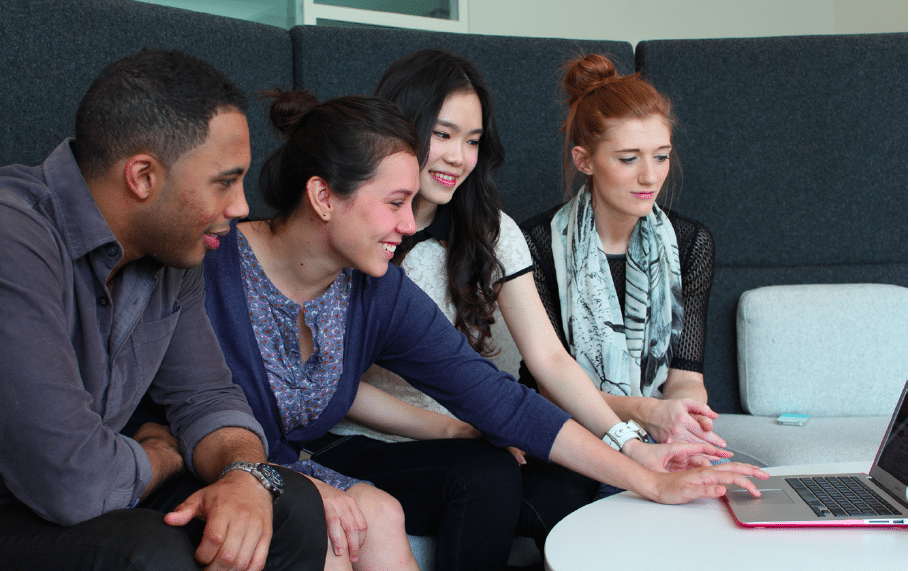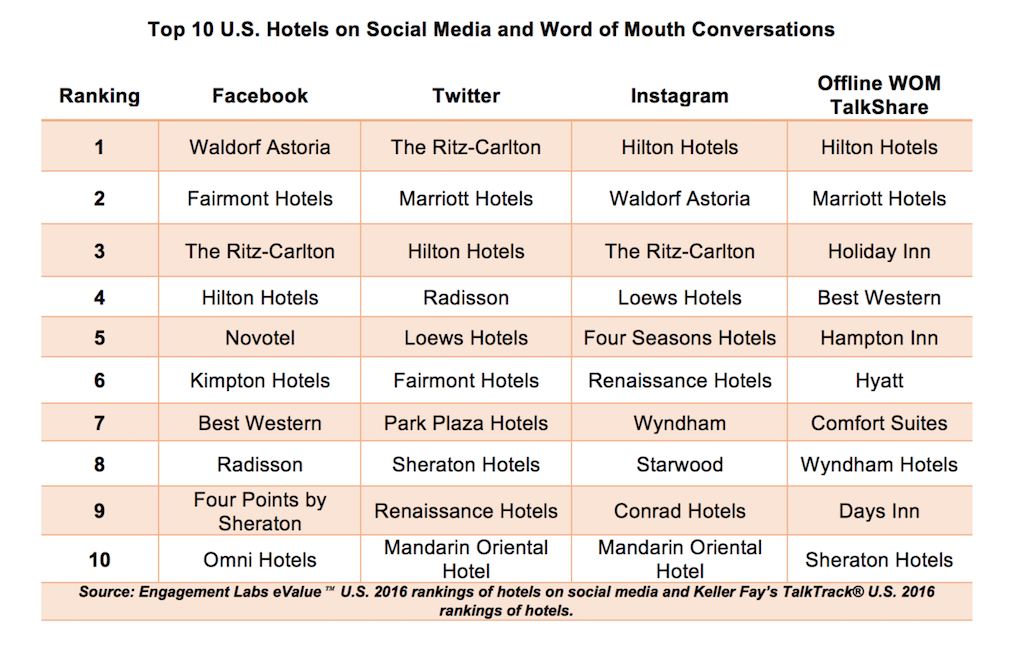Skift Take
Smart hotel brands are upping their content marketing game on social media channels to generate more conversations online and off.
When it comes to social media marketing and consumer engagement, Hilton Hotels, Waldorf-Astoria, and The Ritz-Carlton seem to be doing something right, according to data from Toronto-based technology and data company, Engagement Labs.
For the month of February, Engagement Labs sorted through two of its proprietary data sets to see which hotel brands did the best job engaging, impacting, and responding to consumers both online on Facebook, Twitter, and Instagram, as well as offline. To do that, the company analyzed eValue social media measurement scores and data from TalkTrack, a measurement source of word-of-mouth conversations from the Keller Fay Group, within the U.S. region.
Here’s what they found:
Bryan Segal, CEO of Engagement Labs, says the value of these rankings underscores the importance of social channels and offline conversations to hotels in terms of generating brand awareness, engaging directly with their guests, and translating that dialogue into bookings.
“Social isn’t just a fad,” Segal tells Skift. “It’s a really important channel in terms of driving return on investment. Brands care about what people are talking about. Word of mouth, online or offline, is a huge indicator of sales.” He says that because social channels are about offering brand ongoing opportunities to engage with consumers, it gives hotel brands the ability to add more of a “persona.”
Hilton, Waldorf-Astoria, and The Ritz-Carlton have succeeded in doing just that.
“Hilton is a really good example,” Segal says. “They put a lot of effort in their social media and it shows in terms of what they’ve been able to apply. They’ve put together a very strong effort at building beautiful creative messages and linking that to creative hashtags.” Hilton ranked No. 1 on Instagram with its overall eValue score, and it also saw the most fan growth on Facebook with 12,505 new followers in the month of February. Hilton’s strong eValue and TalkTrack scores may have also had something to do with its newest advertising and marketing campaign, “Stop Clicking Around,” which also happens to be the company’s largest ever in history.
Waldorf-Astoria, Segal says, had the highest engagement score and the most likes and shares per 1,000 fans on Facebook, in large part because of the types of food-oriented content they were posting. “That really drove likes and comments and the shareability of their content.”
The brand most responsive to consumers on Facebook was Four Points by Sheraton, which engaged in two-way conversations to build brand affinity.
The Ritz-Carlton had the highest eValue score and Impact score on Twitter, while Radisson had the highest engagement score thanks to its use of high-quality user-generated images. When it came to engaging with Twitter users, Fairmont Hotels had the highest responsiveness score, taking time to generate thoughtful responses to both positive and negative tweets.
Brands that place a premium on content marketing, especially on Instagram, are seeing success, says Segal. “Content is really at the core of being successful in all of these areas. It’s about reaching into the heart to get to the wallet, and that is done very well on Instagram, for example. You’re selling them on that dream and what it looks like to be at the beach or the action of being at the pool. It’s about what you could be doing. It’s the emotion behind it.”
One social media channel that Engagement Labs has yet to add to its eValue measurements is Snapchat, although Segal says the company is planning to do so soon. “We will endeavor to have Snapchat as a channel,” he says. “The eyeballs and spend right now are on Facebook, Twitter, Instagram, Pinterest, and YouTube. But I don’t want to diminish the power and consumer momentum of Snapchat.”
Segal is also quick to point out that it’s not enough to just look at brand performance on social media channels. “Online along is not a proxy for offline word-of-mouth conversations and likewise,” he says. That’s why Engagement Labs considers offline conversations in its data rankings.
The TalkTrack data works by recruiting more than 35,000 panelists in different regions and countries around the world to answer surveys as well as respond, unaided, about what brands they’ve talked about at any given period. For this report, Engagement Labs looked at TalkTrack data from the U.S.
“With social media marketing, you need to develop similar types of behavior both online and offline,” Segal says. “They have strong engagement—ongoing conversations and relevant, timely engaging content that they are putting in front of their clients, fans, or prospects.”
Have a confidential tip for Skift? Get in touch
Tags: hilton, hotels, ritz-carlton, social media, waldorf astoria
Photo credit: Business students in a social media management course. University of Salford Press / Flickr

